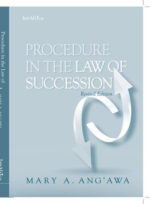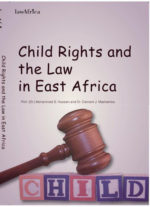A Text Book on Tax Law in Kenya is a treatise on Kenyan tax law. It is a reference book for the training of advocates, accountants, tax agents, consultants, business owners, public among other professionals interacting with tax matters. It is an indispensable handbook for any professional pursuing a career in tax including the decision makers, Judges, Magistrates, and Tax Tribunals. It is an extensive summary of the tax law in Kenya and the tax jurisprudence emanating from Kenyan Courts and Tax Appeal Tribunal.
A Text Book on Tax Law in Kenya
KSh 2,980.00
A Text Book on Tax Law in Kenya is a treatise on Kenyan tax law. It is a reference book for the training of advocates, accountants, tax agents, consultants, business owners, public among other professionals interacting with tax matters. It is an indispensable handbook for any professional pursuing a career in tax including the decision makers, Judges, Magistrates, and Tax Tribunals. It is an extensive summary of the tax law in Kenya and the tax jurisprudence emanating from Kenyan Courts and Tax Appeal Tribunal.
4 in stock
Related products
-
THE NEW CONSTITUTIONAL LAW OF KENYA: PRINCIPLES, GOVERNMENT AND HUMAN RIGHTS
KSh 2,400.00On 27 August 2010, a new Constitution for Kenya was promulgated. The Constitution seeks to re-orient the country by establishing a robust dispensation for good democratic governance amenable to the exercise of human rights. This book is tailored to unveil to the reader the fundamental normative and institutional frameworks of Kenya’s new Constitution. Not only does it define key concepts in constitutional law, generally, it also details how government in Kenya has been restructured and re-organised to give effect to the traditional principles that form the basis of constitutional law.
The golden thread that cuts across the various chapters of the book is the emphasis that good constitutions anchor certain tenets that have garnered recognition as hallmarks of democratic dispensation.These hallmarks include the concept of separation of powers; the doctrine of the rule of law; constitutionalism and human rights. These attributes have largely been secured by the 2010 Constitution. Thus, this book is expected to contribute to this new promise by making knowledge on the Constitution accessible through breaking down and contextualising its provisions. It is certain to be useful to law and government students, lawyers, researchers and other persons who seek to understand the new constitutional order. Morris Kiwinda Mbondenyi, LL.D., LL.M. (UNISA), LL.B. (Moi), Senior Lecturer and Head of Department, African Nazarene University. J Osogo Ambani, LL.D. (Cand), LL.M. (UP), LL.B. (UoN), Lecturer, MoiUniversity School of Law. -
Introduction to Tax Law Revised Edition
KSh 1,600.00The rules of trade can be sophisticated and misunderstood by business people. In this book the author concisely explains the history of tax, how VAT is calculated with the aid of examples, the functions and the role of Kenya Revenue Authority, different trade treaties agreements, terms and documentation.
-
Litigation-The Art of Strategy and Practice
KSh 2,614.00Litigation – The Art of Strategy and Practice is a practical guide for lawyers and law students, offering insights on case strategy, courtroom skills, and effective advocacy.
The book is not meant to be the final solution to all practical legal problems but rather seeks to provide a quick reference to the common topical issues the litigator faces in court.
-
Procedure in the Law of Succession in Kenya-Mary Angawa
KSh 1,800.00One of the difficulties courts have been having in the past in dealing with the Law of Succession Act, had been with the issue of marriage. The Succession Act and the Marriage Act were to have come into operation simultaneously. This did not occur until almost 50 years later. The Marriage Act was gazetted on the 6 May 2014. Parliament amended and consolidated “the various laws relating to Marriage and Divorce and to connected purposes.”
-
International Intellectual Property in an Integrated World Economy (Aspen Casebook)
KSh 60,000.00International Intellectual Property in an Integrated World Economy, Fourth Edition by Frederick M. Abbott, Thomas Cottier, and Francis Gurry, provides a comprehensive treatment of the international intellectual property system across the spectrum of intellectual property rights and interests. It introduces the institutional architecture at the multilateral, regional/plurilateral, bilateral and national levels. For each form of IP, it addresses the technical legal rules and illustrative jurisprudence, as well as economic and social welfare implications. Each of the authors has played a role in the development and implementation of the international rules, and they bring their experience to bear in introducing students to the field.
New to the Fourth Edition:
- The latest developments in bilateral and regional agreements regulating intellectual property, including NAFTA 2.0 (USMCA), CPTPP, and CETA
- Important new judicial decisions, including the U.S. Supreme Court decision adopting international exhaustion of patents and CJEU decisions addressing trademarks, geographical indications, and copyright
- Developments in IP and human rights; IP and competition law; and IP and health
- The WTO panel report in the Australia-Tobacco case
Professors and students will benefit from:
- An approach to the international IP system that situates the rules within the broader context of international law and the public policy objectives that governments, industry, and interest groups are seeking to achieve
- Case law from international dispute settlement bodies, as well as from national and regional courts
- Discussion of patent, trademark, geographical indication, copyright, design, trade secret, and data protection; as well as plant variety protection, protection of genetic resources and traditional knowledge, and the role of open source
- An explanation of the new European Union Unitary Patent system
- Exploration of the increasingly important role of emerging market IP systems
- Materials to help students understand the disputes between the United States and China involving IP, investment, and transfer of technology
- Inclusion of important jurisprudential developments
-
Child Rights and the Law in East Africa
KSh 2,200.00The book seeks to streamline the rights and protection of children in the three common law East African countries through law both now and in the future. The book also serves as a resource material in the area of child rights and the law, not only in East Africa, but also across Sub-Saharan Africa. It further seeks to stimulate debate on effective domestication and implementation of international child rights standards in East Africa.
-
CORPORATE SECRETARIAL PRACTICE IN KENYA
KSh 2,600.00Company and Secretarial Practice in Kenya Today is a practical guide to the core functions and responsibilities of a Company Secretary and, therefore, the secretarial function in the present day Kenya. This handbook covers company secretarial duties as laid down by statute, common law and good practice.
-
Principles of Constitutional Law -(Law africa)
KSh 2,700.00The main aim of this book is to provide the reader with knowledge and understanding of some of the key concepts, doctrines and principles which make up that corpus of law known as constitutional law. Another aim is to develop a sound academic basis for the study of subjects based on public law, such as political science and international relations.








Be the first to review “A Text Book on Tax Law in Kenya”